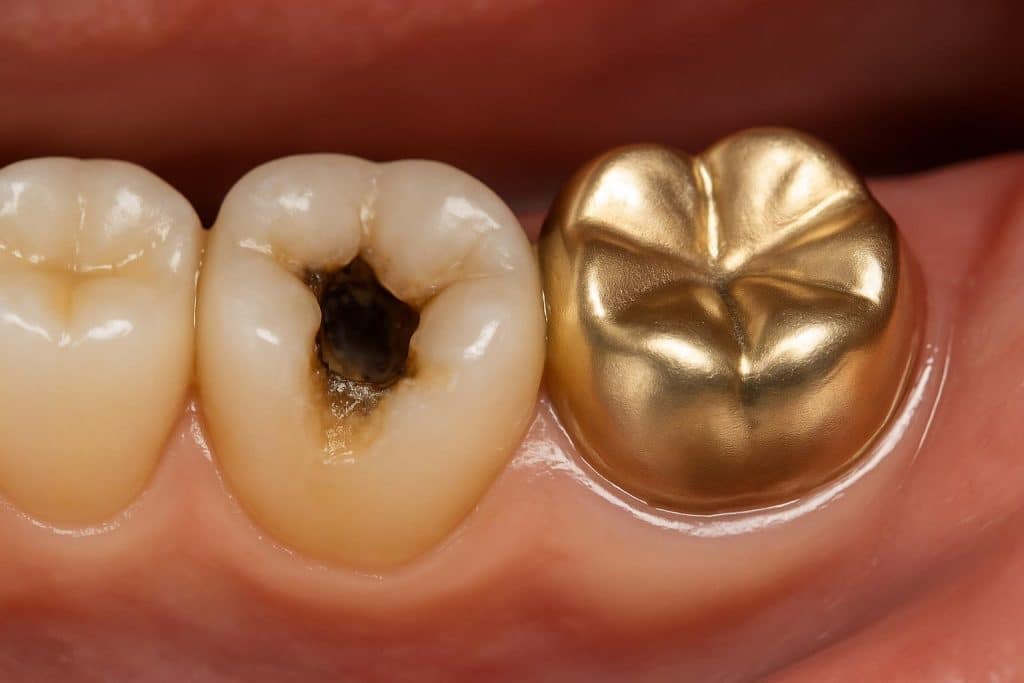Dental care decisions often involve evaluating the most effective ways to restore teeth while maintaining their function and durability. When cavities grow beyond a certain size, simple fillings may not provide the strength or protection necessary for long-term oral health. Crowns, which cover the entire visible portion of a tooth, can offer more stability and safeguard the tooth from further damage. We will explore why crowns are sometimes a more suitable choice than fillings for large cavities, examining their advantages and the factors that guide dental professionals in making this recommendation. Understanding these differences can help patients make informed decisions about their dental treatments and protect their oral health more effectively.
When Crowns Outperform Fillings
- Enhanced Structural Support
Large cavities often weaken the tooth structure, making it more susceptible to fractures. Fillings restore only the missing portion of a tooth and rely on the remaining natural enamel for support. In contrast, crowns completely encase the entire tooth, distributing biting forces evenly across its surface. At our North Vancouver clinic, we often recommend crowns for teeth that experience heavy chewing pressure, such as molars, because they help prevent cracks or breaks. A crown acts like a protective cap, ensuring that the tooth remains functional and stable even when most of its original structure has been compromised. For patients with extensive decay or previously treated teeth, crowns provide a level of reinforcement that fillings simply cannot achieve. This structural support can extend the lifespan of a damaged tooth and reduce the likelihood of future repairs.
- Longevity and Durability
While fillings can serve well for small to moderate cavities, they are prone to wear, shrinkage, and marginal leakage over time. Large fillings can fail if the tooth continues to be subjected to significant pressure or if the filling material begins to separate from the enamel. Crowns, made from materials such as porcelain, ceramic, or metal alloys, are designed to withstand daily wear and provide a long-lasting solution. Their durability reduces the need for frequent replacements, making them a more reliable option for teeth with extensive decay. Additionally, crowns can protect underlying dental work, such as root canals, which often accompany large cavities. Patients with crowns typically experience fewer complications and maintain stronger oral health over the years compared to those relying solely on large fillings.
- Protection Against Further Decay
Large cavities not only compromise tooth structure but also create conditions that facilitate the accumulation of bacteria more easily. Fillings repair the damaged portion, but the surrounding enamel may remain vulnerable. Crowns cover the entire tooth surface above the gum line, creating a barrier that minimizes exposure to harmful bacteria. This comprehensive coverage helps reduce the risk of recurrent decay, which is particularly important for patients with cavities that have reached deep into the tooth. By sealing the tooth more completely than a filling, crowns provide added protection, maintaining oral hygiene and reducing the likelihood of additional treatments in the future.
- Aesthetic Advantages
Crowns are often customized to match the color, shape, and size of natural teeth, providing both aesthetic and functional benefits. Large fillings can sometimes be noticeable, particularly if they are made of amalgam or a material that does not blend seamlessly with the surrounding tooth. For front teeth or other visible areas, crowns offer a more uniform appearance, restoring both the form and function of the tooth. This aesthetic consideration can enhance a patient’s confidence in their smile while ensuring the tooth remains strong and protected. The combination of durability and natural appearance makes crowns a preferred choice when cavities affect teeth that are highly visible or play a key role in a patient’s smile.
- Reduction of Sensitivity and Discomfort
Extensive cavities can expose nerves within the tooth, leading to sensitivity or discomfort, especially when consuming hot, cold, or sweet foods. Large fillings may not fully insulate the tooth, leaving some areas vulnerable to temperature fluctuations. Crowns, by covering the entire tooth, provide better insulation and protection for the inner structures. This can significantly reduce sensitivity and improve comfort during daily activities. For patients who have undergone repeated dental treatments, crowns offer a more stable and consistent solution, minimizing irritation and providing long-term improvements in oral comfort. By addressing both structural and sensory concerns, crowns can enhance the overall quality of life for individuals with compromised teeth.
- Support for Teeth with Extensive Damage
When cavities become very large or when a tooth has already undergone procedures like root canal therapy, the remaining tooth structure may be insufficient to hold a filling securely. In such cases, fillings alone may not be sufficient to adequately restore the tooth, and repeated failures could lead to extraction. Crowns provide a reliable way to rebuild and maintain teeth with significant damage. They act as a framework, reinforcing fragile areas and allowing patients to continue using the tooth normally. This approach reduces the risk of losing a tooth entirely, preserving natural dentition and avoiding the need for more complex restorative procedures such as implants or bridges. Crowns provide a comprehensive solution when damage is extensive and structural integrity is paramount.
Selecting the appropriate restoration for large cavities is essential for maintaining long-term dental health, functionality, and comfort. Fillings can be effective for smaller areas of decay, but when cavities are extensive, crowns offer superior support, protection, and durability. They shield the tooth from further damage, improve aesthetics, reduce sensitivity, and maintain proper bite alignment. Crowns also minimize the need for repeated repairs and provide a long-lasting solution for teeth that are compromised. By understanding the benefits that crowns provide over large fillings, patients can make informed decisions that protect their oral health and enhance the longevity of their teeth. Crowns are not just a repair; they are a comprehensive approach to preserving the integrity and function of teeth affected by significant decay.
